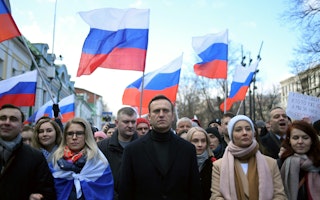Churches in Former Soviet States Are Becoming Political Power Players

Even in countries with well-established democratic institutions, the relationship between religion and politics can be fractious and controversial. In Georgia, Armenia, Ukraine, and Moldova, this delicate balance is becoming increasingly fraught.
Since the collapse of the Soviet Union, religion has become a powerful force across the region. A new Foreign Policy Centre publication titled Traditional Religion and Political Power shows the central role that churches in Georgia and Armenia have played in re-establishing those countries’ national identities and how, in Ukraine and Moldova, the Russian Orthodox Church has been forced to adapt to the new states it finds itself in. The upshot is a glimpse of religion’s role in determining these four countries’ futures.
In Ukraine, the adaptation is particularly challenging, as different branches of the church respond to competing ideas of what it means to be Ukrainian. In the early 1990s, there was a dramatic split in which the Orthodox Church–Kiev Patriarchate (UOC-KP) broke away from the Orthodox Church–Moscow Patriarchate (UOC-MP) after calls for independence for the church in Ukraine were rejected by Moscow. The UOC-MP remains part of the Russian church, albeit with some local decision-making powers.
The impact of the Maidan protests and the conflicts with Russia have dramatically changed the balance of power between these two churches. Until recently, the UOC-MP dominated religious life and was the favored partner of pro-Russian politicians in Ukraine. But despite being the only church in Ukraine recognized by the international orthodox community, its position is now seriously threatened. Our publication documents how certain UOC-MP priests have been seen as supporting the separatists—blessing battle flags in Donbass, for example—causing significant damage to the church’s reputation.
Meanwhile, the UOC-KP has very effectively used the Maidan protests and current crisis to bolster its popularity. It has embraced the national mood and backed the Ukrainian authorities in the conflict in the east. Rallying around the flag has won it new followers—now more Ukrainians say they support the UOC-KP than its rival, though accurate church attendance data is hard to come by. The UOC-KP’s goals are to consolidate its newfound strength, position itself as the national church of Ukraine, and finally achieve the international recognition it has long craved.
In Georgia, too, the church is an increasingly powerful and independent-minded political actor. Traditional Religion and Political Power shows how church support for the Georgian Dream coalition helped it rise to power in 2012 and has continued to assist it in recent elections, reflecting both the more conservative approach of some of its members and former Prime Minister Bidzina Ivanishvili’s longstanding financial support of the church. The church has been an outspoken opponent of LGBTI rights, even going as far as leading riots against pro-LGBTI rallies. Its social conservatism has both shaped and reflected homophobic attitudes in wider Georgian society. And at a local level, it has been involved in attacks on and discrimination against minority faith groups.
In Armenia, the Armenian Apostolic Church’s problems mirror that of the elite in general: an atmosphere of corruption that risks undermining public trust over the longer term. Widespread patronage of the church by oligarchs and politicians is used to boost social status and political support, while transparency about its finances is lacking. Our publication identifies a need to reform the Law on Freedom of Conscience and on Religious Organizations to end discrimination against minority faiths, and to develop a new antidiscrimination law covering employment and other areas. There are also concerns about the church’s increasing influence in education.
Finally, in Moldova, the church is part of the Moscow Patriarchate, and is seen as a strong supporter of the Russian worldview. It espouses traditional social values in a country whose pro-European orientation is at risk, following the collapse of the coalition government. The state has been slowly reforming its legislation to reduce discrimination against minorities, in the face of strong opposition from the church, as part of Moldova’s EU Association process and after a critical report by the UN Special Rapporteur on freedom of religion or belief.
Across the region, but particularly in Georgia and Moldova, a culturally conservative approach to LGBTI, women’s, and minority faith rights has been used by the churches to win public support. It is a narrative that has put the EU at odds with the churches and in direct competition with Russia. Traditional Religion and Political Power shows how both the Russian Church and state have actively promoted this traditional-values agenda as part of their “Russian World” ethos, with which they have been looking to influence the churches and societies of their “near abroad.”
The Russian social agenda dovetails with that of the orthodox communities in these four countries. However, this shared approach and a desire for good relations between churches does not always translate into a desire for a return to the Russian fold across the board. Churches in Georgia and Armenia, for instance, are keen to maintain their growing independence, and social issues are often drowned out by the impact of war in Ukraine.
Whether on social issues or geopolitics, however, our publication argues that the EU and wider international community ignore church influence at their peril, as these churches are often the most trusted institutions in their societies.
The Foreign Policy Centre is a grantee of the Open Society Foundations.
Download the complete report on the role of religion in Georgia, Armenia, Ukraine, and Moldova.


